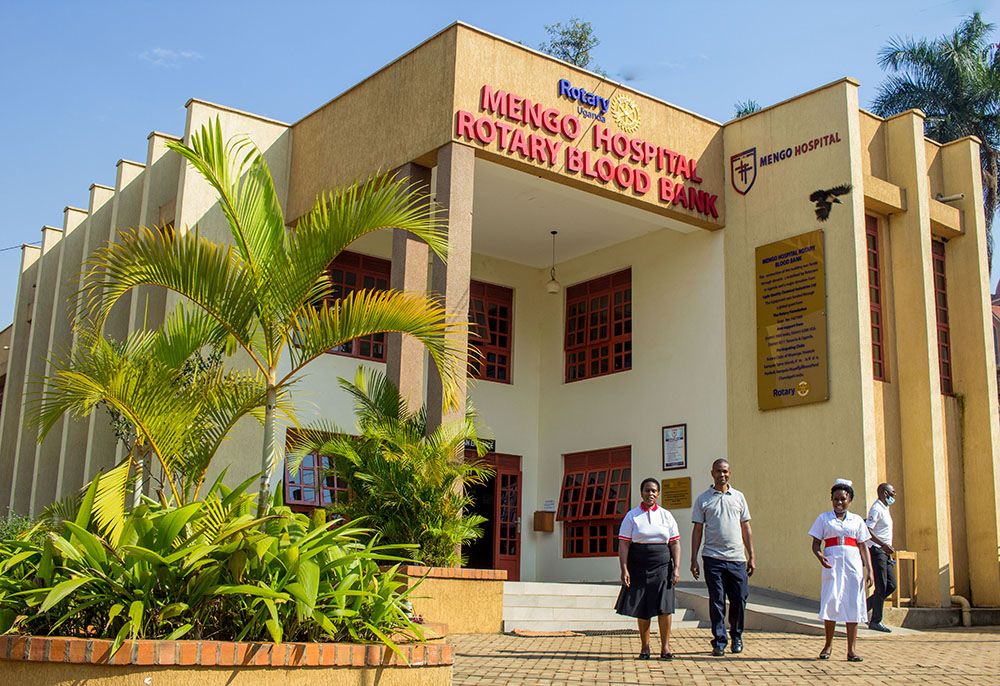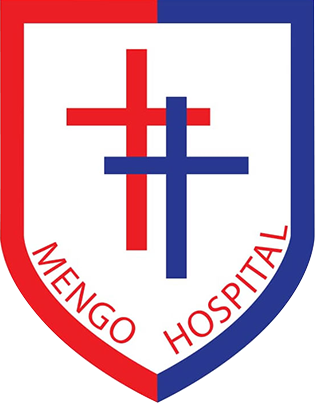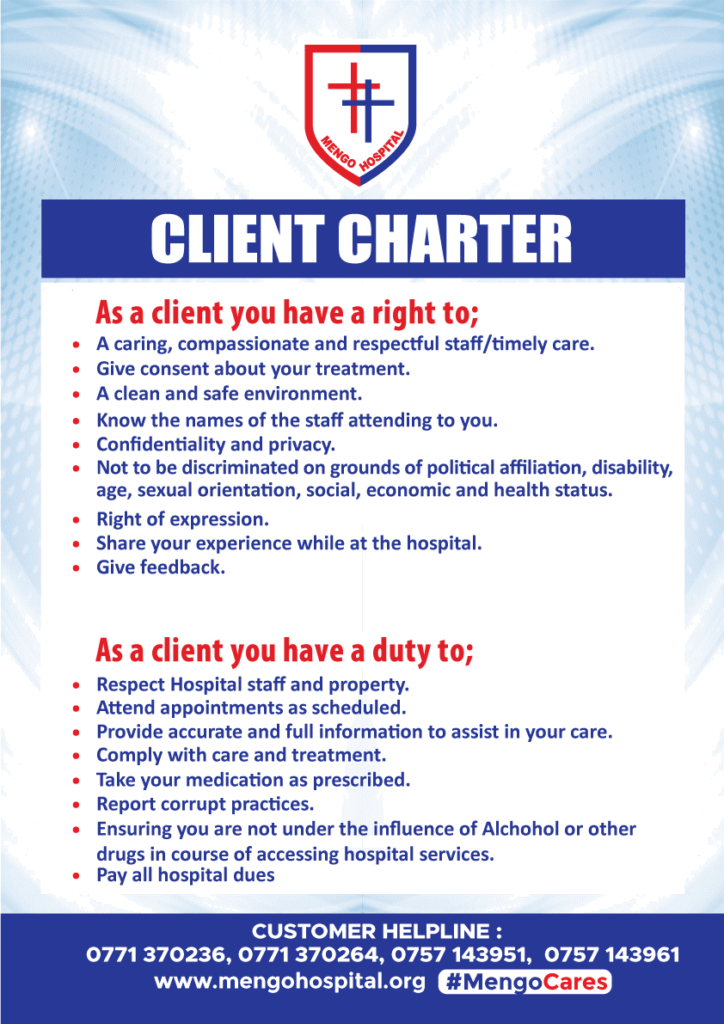Blood Bank


Mengo Hospital has a Blood Bank facility known as the Mengo Hospital Rotary Blood Bank. This blood bank was established four years ago by the Rotary Fraternity in partnership with Mengo Hospital, with PDG Emmanuel Katongole as the vision bearer. Its purpose is to help close the gap in blood shortages across the country.
The Mengo Hospital Rotary Blood Bank was officially launched on 27 February 2017 by Mr. John F Germ, Rotary International President at the time, and Rt. Hon. Dr. Ruhakana Rugunda, Prime Minister of the Republic of Uganda. It began as a blood collection center and has grown into a fully fledged blood bank, second only to the Nakasero Blood Bank nationwide. The blood bank is regulated by the Uganda Blood Transfusion Services located in Nakasero.
This facility supplies free blood and blood products at no cost to hospitals across the country. It operates 24 hours a day and is accessible to all hospitals with transfusion licenses.
The Mengo Hospital Rotary Blood Bank collects blood mainly from communities, schools, churches, and other institutions through daily field sessions and voluntary donations from walk-in donors at Mengo Hospital. The blood bank has greatly improved the availability of blood in Uganda, collecting and dispatching about 1,500 units of blood every month.
The blood bank is headed by Dr. Kakuba Frank, a medical doctor at Mengo Hospital and a Rotarian specializing in pathology. Rotarian Ronald Kawaddwa serves as the Board Chair of the Mengo Hospital Rotary Blood Bank. Its steady growth and development have been made possible through ongoing support from the Rotary Fraternity, which continues to organize various initiatives and fundraising drives through Rotary Uganda.
History of Rotary Blood Bank
Founded through the collaboration between Mengo Hospital and The Rotary Foundation, the Mengo Hospital Rotary Blood Bank has been a cornerstone in addressing Uganda’s persistent blood shortages since its launch in 2017. Rotary’s efforts in providing funding, raising awareness, and facilitating blood donation drives were instrumental in the blood bank’s development.
The idea of the blood bank was birthed around 2013 by the Rotary Fraternity and Mengo Hospital, the vision bearer being PDG Emmanuel Katongole. The aim of starting the blood bank is to bridge the gap of blood shortage in the country. The Mengo Hospital Rotary Blood Bank was officially launched on 27th February 2017 by Mr. John F Germ the Rotary International President (2016-2017) and Rt.Hon. Dr. Ruhakana Rugunda-Prime Minister of the Republic of Uganda.
It started as a blood collection Centre and it has grown into a fully-fledged blood bank only second to Nakasero blood bank in the whole country. The blood bank is regulated by Uganda Blood Transfusion Services UBTS in Nakasero.
Over the years, Rotary has helped foster a culture of regular blood donation across communities, ensuring that the blood bank can maintain a steady supply of lifesaving blood. This partnership continues to strengthen Uganda’s healthcare system, with the blood bank serving as a key resource for hospitals and clinics nationwide.
About Blood
Blood is composed of red blood cells, white blood cells, platelets, and plasma, each playing a crucial role in the body’s function. The four main blood groups (A, B, AB, and O) are categorized by the presence of antigens on the surface of red blood cells:
- Group A has A antigens;
- Group B has B antigens.
- Group AB has both A and B antigens (universal plasma donor).
- Group O has no antigens (universal blood donor).
Additionally, the Rh factor (positive or negative) further classifies blood. Matching these groups is essential for safe transfusions:
- O- is the universal donor.
- AB+ is the universal recipient.
Knowing your blood type is essential because it determines who you can donate to or receive blood from. Blood type compatibility ensures that transfusions are safe and successful
Why Donation Matters
In Uganda, blood is needed every day for emergencies, surgeries, cancer treatment, childbirth, and severe illnesses such as anemia and malaria. Uganda’s hospitals often face acute blood shortages, particularly during crises like road traffic accidents, which claim many lives due to insufficient blood for transfusions. Despite the high demand, blood donation rates remain low, and the availability of blood can be the difference between life and death for many patients.
This blood bank has greatly contributed to blood availability in the country, we collect and dispatch about 1500 units of blood monthly
According to the World Health Organization (WHO), Uganda requires a minimum of 340,000 units of blood annually, but due to various challenges, such as limited awareness and access to donation centers, the actual collection is significantly lower. Donating blood ensures that hospitals and health centers are prepared to meet urgent needs, reducing the number of lives lost due to blood shortages.
The most common recipients of blood are:
- Children with malaria (60%)
- Pregnant women with complications (30%)
- Accident victims, cancer patients, and those undergoing surgery (10%)
Uganda needs at least 340,000 units of blood each year, but donations often fall short of this demand. By donating blood, you provide a lifesaving remedy to those in critical need.
Services at the Blood Bank
At the Mengo Hospital Rotary Blood Bank, we provide a full range of blood services that ensure a constant, safe supply of blood:
- Community Blood Drives: We organize blood drives at schools, churches, workplaces, and other community hubs to make donating blood accessible.
- Blood Collection & Testing: Every donation is thoroughly tested for infectious diseases, including HIV, hepatitis B, and syphilis, following strict safety protocols.
- Processing & Storage: We process whole blood into its components—red blood cells, platelets, and plasma—and store them under optimal conditions, ensuring they are ready for immediate use.
- Distribution: Blood is distributed to hospitals and clinics across Uganda based on demand, ensuring that patients in critical need can receive timely transfusions.
Blood Products
When you donate blood, it is separated into the following components, each with different medical uses:
- Whole Blood: Used in cases of severe trauma or major surgeries requiring large blood volumes.
- Red Blood Cells (RBCs): Essential for patients with anemia, blood loss from surgeries, or accidents.
- Plasma: Contains proteins that help with clotting; used in treatments for liver disease and severe burns.
- Platelets: Crucial for cancer patients and individuals with clotting disorders.
- Cryoprecipitate: A concentrated plasma product used to treat hemophilia and other clotting deficiencies.
Each of these components plays a crucial role in treating different medical conditions, maximizing the impact of every blood donation.
Why Donate Blood?
Blood donation offers several benefits to both the donor and the wider community:
- Blood is a lifesaving resource that only humans can provide There is no substitute for human blood, and it cannot be manufactured.
- Life-Saving Impact: One donation can save up to three lives, as the blood is separated into different components.
- Health Check: Donors receive a free mini-physical that includes a blood pressure check, pulse measurement, and hemoglobin test.
- Heart Health: Regular blood donation can help reduce iron levels in the body, which may lower the risk of heart disease.
- Community Contribution: Donating blood fosters a sense of responsibility and community spirit, as you are directly helping others.
Eligibility to Donate Blood
You can donate blood if you meet the following criteria:
- Age: Between 17 and 65 years old.
- Weight: At least 50 kg.
- Health: Must have a hemoglobin level of at least 12.5g/dl, normal blood pressure, and no infections or fever in the last three weeks.
- Medical Screening: We conduct a thorough health screening before every donation, including checking haemoglobin levels and reviewing your medical history.
Who Should Not Donate?
- Those with HIV, hepatitis B or C, syphilis, or any other blood-transmissible infection. Before donation, all potential donors will be screened to ensure they meet the eligibility requirements.
Blood Testing and Results
All donated blood undergoes rigorous testing for transmissible diseases, including:
- HIV
- Hepatitis B and C
- Syphilis
- Blood group testing is also conducted.
Results are generally available within two weeks. Donors are encouraged to return to the donation site to receive their results from a qualified counselor.
Blood Transfusion Process
Blood collected at the Mengo Hospital Rotary Blood Bank is distributed to hospitals and health centers across Uganda. Blood is not sold, and it remains a free resource for patients who require transfusions. Hospitals are responsible for requesting and collecting the necessary units of blood from the blood bank to treat their patients.
For those in need of a blood transfusion:
- Request Blood: Your hospital will request blood from the blood bank, specifying your blood type and the necessary quantity.
- Cross-matching: Before transfusion, your blood will be cross-matched with the donor blood to ensure compatibility.
- Transfusion: The blood transfusion is done in a controlled environment, supervised by trained medical staff to ensure the safety of the patient.
Quality Assurance
We follow strict protocols to ensure the safety and quality of every blood donation:
- Infectious Disease Screening: All donated blood is tested for HIV, hepatitis B and C, and syphilis.
- Safe Storage: Blood is stored under precise conditions to ensure its safety and efficacy.
- Compliance with Guidelines: We adhere to both national and international standards for blood collection, testing, and transfusion, ensuring the highest levels of safety and care for all patients.
Blood Donation Drives
The Mengo Hospital Rotary Blood Bank organizes regular community blood donation drives to ensure a constant supply of blood. These drives are held at schools, businesses, places of worship, and community centers, making it easy for everyone to donate.
Donor Recruitment Section-This unit is responsible for the recruitment of donors and all the associated social work in the Mengo Hospital Rotary Blood Bank and the field activities.
Should you need to donate blood right from the blood bank, your workplace, institution, church, school, or plan on a blood donation camp, contact our Donor Recruiter on +256 782 614 316
Your donation could be the difference between life and death for someone in need.
Want to donate blood?
If you would like to donate blood at the blood bank, at your workplace, institution, church, school, or if you wish to organize a blood donation drive, please contact our Donor Recruiter on 0782 614 316.
Safe blood saves lives, and your donation can make a lasting difference.

